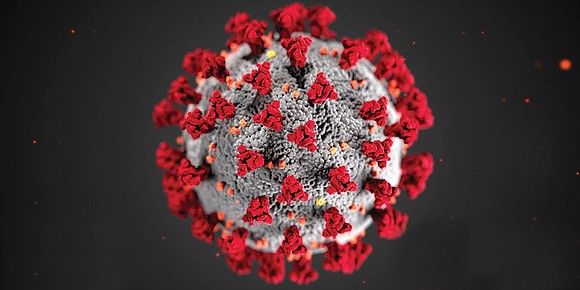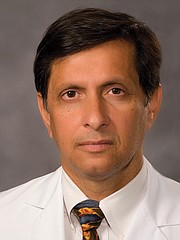Challenging times
Threat of COVID-19 shuts down schools, businesses and non-essential services across Richmond and the state as the number of cases and death toll rise
George Copeland Jr. | 3/26/2020, 6 p.m.
Virginia is gearing up for a months-long undertaking to stop the threat of coronavirus as each day brings more news of new cases, deaths and measures from local and state authorities to combat the spread.
So far, 391 positive cases of and 13 deaths from the virus have been confirmed across the state, according to the Virginia Department of Health.
Arlington County, Fairfax County, James City County, Newport News, Poquoson, York County and Williamsburg so far are the most impacted, the VDH reported, although Metro Richmond also has reported a rising number of confirmed cases and deaths.
The Richmond area suffered its first losses this week when three elderly residents of Canterbury Rehabilitation and Health- care Center in Henrico County were reported to have died on Tuesday and Wednesday as a result of COVID-19.
About 1,600 Virginians have been tested by state and private labs so far, with health officials warning that the number of positive cases is likely to rise as testing capacity increases and community spread continues.
“We are just at the beginning of this,” Gov. Ralph S. Northam said during the daily news briefing Wednesday afternoon. “We’re not talking about weeks, we are talking about months. And we are going to see these numbers, unfortunately, continue to rise.”
In response, state and local authorities have announced new steps in a bid to halt the spread and the potential overloading of health care facilities. Many of the new guidelines were part of an executive order Gov. Northam signed Monday closing all K-12 schools in Virginia for the rest of the academic year, shutting down recreational businesses and adding restrictions on others that serve the public, enforced in whatever way localities deem necessary.
Education officials are waiving most of the requirements for seniors to graduate, including requirements for passing certain standardized end-of-course tests. Local school boards also have discretion to make decisions.
“These are truly unprecedented times,” Richmond Public Schools Superintendent Jason Kamras said in a message Wednesday to students, families and staff following Gov. Northam’s announcement. “RPS may be officially closed, but we are always open to support you in any way we can.”
The governor also ordered the closure of movie theaters, bowling alleys, racetracks, swimming pools and other recreational and entertainment businesses. Also required to shut down are personal care shops like barbershops, beauty parlors and nail salons that cannot comply with social distancing guidelines of 10 patrons or less and for people to remain 6 feet apart.
Grocery stores, pharmacies and banks, which are deemed essential, can remain open. The construction industry also can remain in full operation, as can food manufacturers and others engaged in production regarded as essential.
Other outlets, including restaurants, can stay open for take-out and delivery only. State parks will become day-use only starting Friday morning.
For his part, Richmond Mayor Levar M. Stoney stated Tuesday that failure to practice social distancing in the city’s parks could lead to the city closing them and the James River Park System. He said there can be no groups playing games like basketball and pickleball or just hanging out, including at Texas Beach and other spots along the river.
“We believe we can tackle this crisis, but we can only do it together,” the mayor said.
Following up on the state Supreme Court’s decision to halt lower courts from ordering evictions, Mayor Stoney also announced that Richmond Sheriff Antionette V. Irving has agreed to shut down the unit that conducts evictions. He has also called on the Richmond Redevelopment and Housing Authority to extend its public housing eviction freeze beyond May 1.
“Responding to this challenge with speedy and just action requires compassionate decision- making on all levels,” Mayor Stoney said. “No one should lose their home in the middle of a pandemic.”
Virginia also is exploring ways to get more people qualified as doctors, nurses and personal care assistants. The state is reworking licensing procedures, discussing bringing in medical students and urging retirees and others with military or other training to join the Virginia Medical Reserve Corps.
Gov. Northam also announced that state officials are looking at potential sites for temporary hospitals to be constructed by the U.S. Army Corps of Engineers “should the need arise.” He said while the need for bed space for COVID-19 patients is adequate now, the demand is expected to grow and outpace current hospital capacity. “We see that coming,” the governor said.
The University of Virginia Health System has offered newly developed tests to hospitals across the commonwealth, while the Virginia Commonwealth University Health System announced Wednesday the development of its in-house tests for patients who have severe symptoms of COVID-19 and require hospitalization.
Both tests will expand the capacity to test for COVID-19, with VCU hopeful for same-day results. U.Va. currently is able to perform more than 100 tests daily and offers up to 50 tests a day for other hospitals and patients that meet clinical testing guidelines, with results available in under two hours.
While the breadth and scope of containment efforts expand, there are areas where Virginia officials have less control.
Gov. Northam said Virginia has put in a second request for medical supplies from the national stockpile, having already distributed supplies received from its first request at the start of the week.
The need for personal protective equipment for medical professionals and first responders is high, Gov. Northam said, with states “literally competing” against each other for medical supplies as prices soar.
“Allowing the free market to determine avail- ability and pricing is not the way we should be dealing with this national crisis,” Gov. Northam said, calling for the federal government to take control to create more orderly production and distribution as has occurred during past wars.
While a $2 trillion relief package is working
its way through Congress, President Trump is undermining the social distancing message. Rejecting the view of health experts, he suggested this week that normal life could resume after Easter Sunday, April 12.
Gov. Northam, a physician, and other medical experts and the Centers for Disease Control and Prevention believe the worst of the coronavirus, and the most serious impact on medical systems across the nation, is yet to come.
Gov. Northam also urged Liberty University in Lynchburg to reconsider its choice to reopen its doors to students. While the governor has no authority to force the private university to close, he called on the school’s leadership to follow the example of publicly supported schools and shift to an online program entirely.
“We have heard too many mixed messages around COVID-19, and this is yet another example,” Gov. Northam said. “Our message has been clear, and it will continue to be clear — stay home unless you have to leave for essential reasons.”
VCU leads clinical trials on drug to treat COVID-19
Researchers at Virginia Commonwealth University are participating in a trial of an experimental treatment for patients with moderate to severe symptoms of COVID-19, the novel coronavirus that has spread around the world.
Dr. Anrun Sanyal, a liver specialist and professor of internal medicine in the VCU School of Medicine, is leading human clinical trials on the anti-viral drug remdesivir that Gilead Sciences Inc. developed and that was used to treat Ebola.
The idea of using it to treat coronavirus stemmed from its use on a man hospitalized with the virus in Washington in a last-ditch effort to save his life.
“We feel it is extremely important that drugs to be used for this potentially life- threatening disease be tested rigorously so we have good evidence of their efficacy as well as their safety,” Dr. Sanyal stated in the announcement Tuesday.
“We look forward to generating the data that hopefully will help lots of people who have this condition.”
VCU is one of a handful of institutions in the United States to begin using the drug on humans. The first randomized, controlled tests in the nation began in February.
Remdesivir has previously shown anti-viral activity against other coronaviruses like SARS, severe acute respiratory syndrome, and MERS, Middle East respiratory syndrome, in vitro and in animal models. But clinical trials were never completed because of the lack of available study participants, and the investigational drug is not currently publicly available, VCU stated.
The drug works by mimicking the appearance of part of the virus and infiltrating the enzyme that viruses can use to replicate themselves. It is designed to slow the infection of healthy cells in a patient’s body.
“Our team members at VCU and VCU Health have been actively searching for ways to combat COVID-19, a virus that has disrupted our lives and the lives of those we serve,” said Dr. Peter Buckley, dean of the VCU School of Medicine, interim senior vice president for VCU Health Sciences and chief executive officer of VCU Health System.








